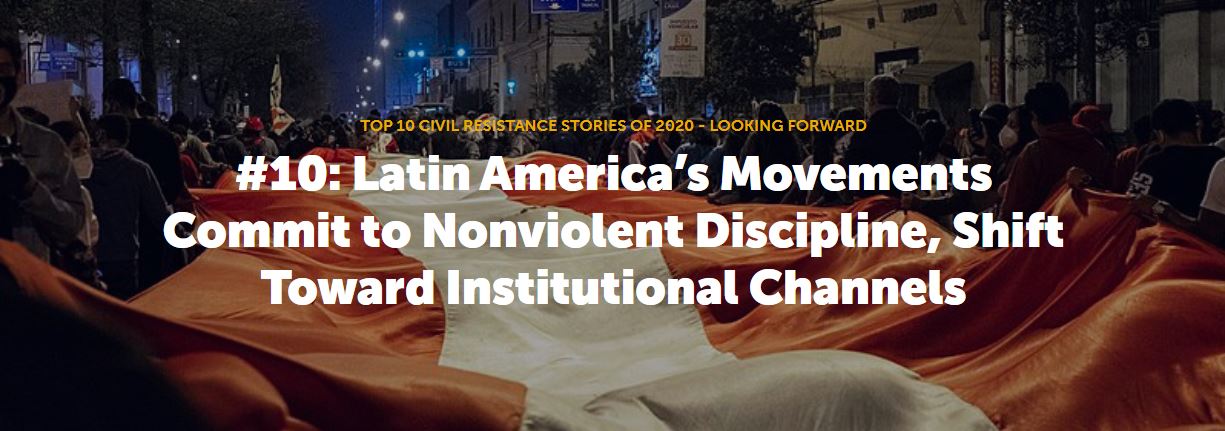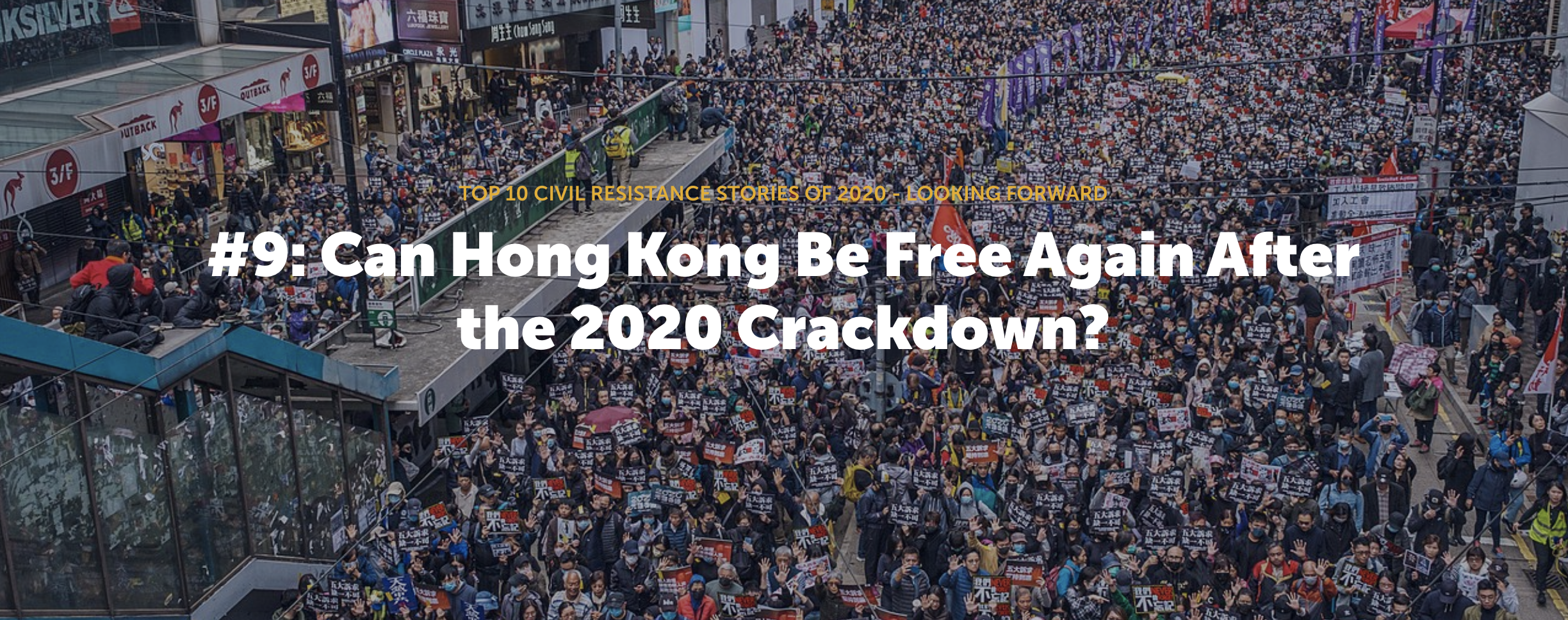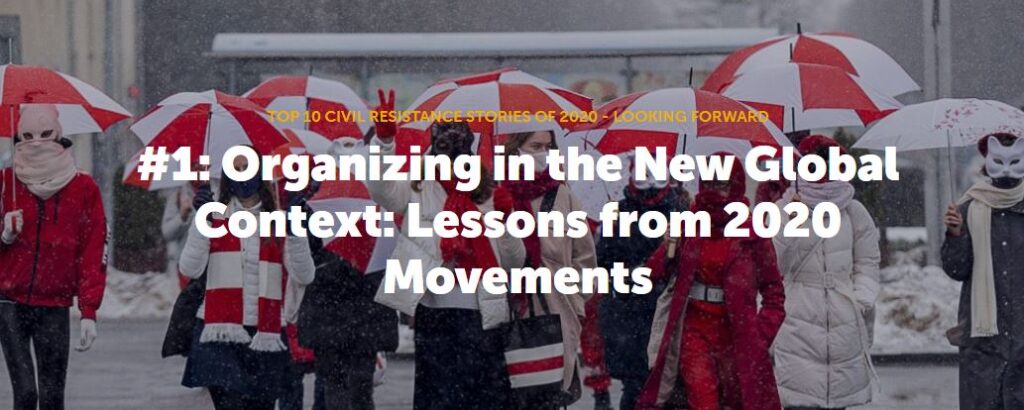Minds of the Movement
An ICNC blog on the people and power of civil resistance
The International Center on Nonviolent Conflict is pleased to introduce its "Top 10 Civil Resistance Stories of 2020, Looking Forward" series countdown, hosted by the Minds of the Movement blog.
Contributions are from diverse voices around the world capturing regional overviews, some of the year's most prominent country case studies, and thought pieces distilling major international trends.
Exclusive on Minds of the Movement...
Join the conversation on Twitter @civilresistance, hashtag #ICNC2020Top10
By: Omar Lopez
The pandemic this year hasn’t stopped people in Latin America from gathering and pushing for their rights, justice, and democracy agendas. In some cases, government mismanagement or inaction even provoked mass demonstrations, as was the case in Brazil. Yet this is not the only civil resistance trend one may identify in the region this year. Although violence remains an instrument of choice for many non-state groups, by and large, the stereotype of the armed guerrilla fighter as the symbol of a freedom fighter, which has plagued the collective conscience of Latin America for centuries, [...]
Read more
By: Victoria Tin-bor Hui
On December 2, high-profile Hong Kong activists Joshua Wong and Agnes Chow received jail sentences for 13.5 months and 10 months, respectively, for peacefully surrounding the police headquarters in June 2019 against the Beijing-backed Hong Kong government. The next day, Jimmy Lai, publisher of the only pro-democracy newspaper the Apple Daily, was arrested and denied bail for violating the terms of the media’s lease.
Hong Kongers have been protesting to defend freedoms and demand democracy for decades, to no avail. With all forms of open dissent being banned by 2020, Hong Kongers are wondering if and how they will be able to keep the fire burning and not give up.[...]
Read more

By: Deborah Mathis
In 2020, civil resisters ripped the cover off long-held grievances and long-running wrongs. They fostered new coalitions from across the demographic spectrum. They changed the old “you say”/”I say” about race and justice into a frank conversation, an exercise in self-reflection and, as importantly, an exercise in listening. There is one other thing this year’s ubiquitous and unrelenting mass demonstrations for social justice accomplished: They produced a maturation in how the news media cover civil resistance, both in the United States and abroad.[...]
Read more
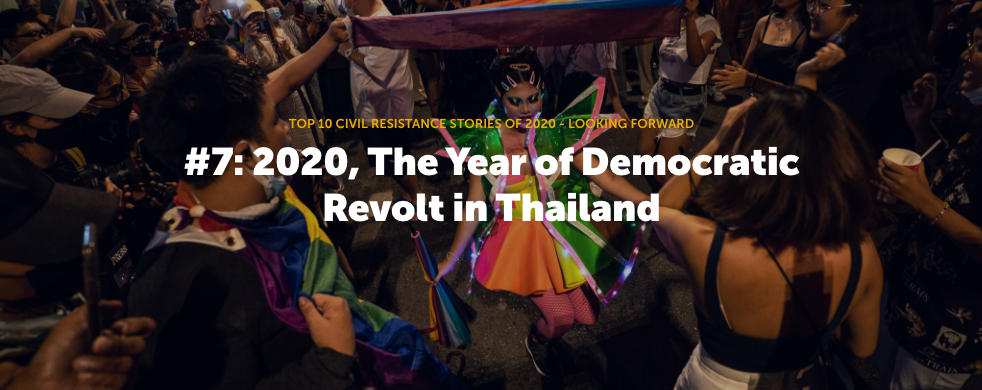
By: Janjira Sombatpoonsiri
Thailand’s ongoing democratic revolt is historically unprecedented. Not only does the movement systemically challenge deep-rooted autocracy, but through decentralized organization and a variety of creative tactics, it has been consistently nonviolent. The movement has emerged against all odds, both harsh repression on the one hand and disruptive impact of the pandemic on the other. Whether Thailand’s people power will succeed in pushing back against autocracy sheds light on the future success of nonviolent struggle against the current global wave of autocratization. [...]
Read more
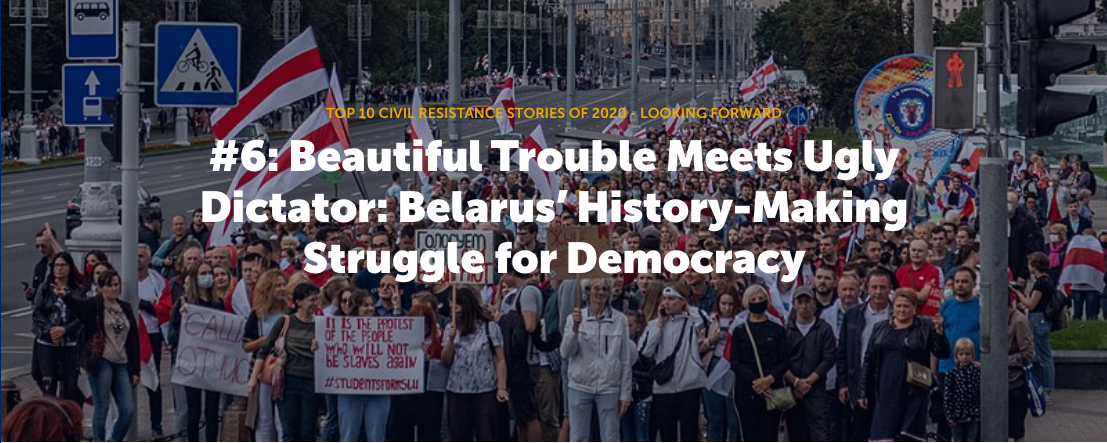
By: Svetlana Kabanova
By remaining nonviolent in defiance of a progressively brutal, 26-year-running dictatorship, Belarusians are embracing life over death but also doing so with a shrewd strategy in mind. The official results of the presidential election in Belarus last August indicated that more than 80 percent of votes were for the incumbent president Alexander Lukashenko, landing him his sixth consecutive term. But the majority of the population didn’t trust these numbers, believing that only very few people voted for Lukashenko. [...]
Read more
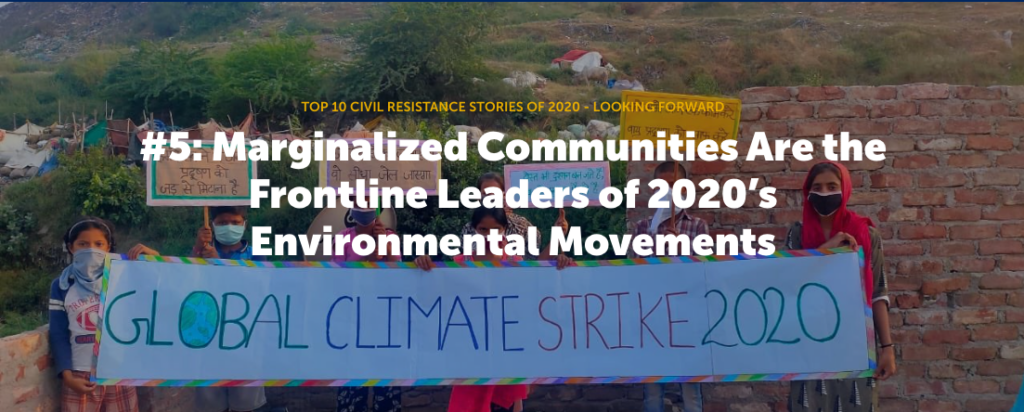
By: Michael Wilson Becerril
In 2020, youth climate activists collaborated on nonviolent actions in more than 40 countries, staged climate strikes on every continent, and developed mutual aid networks to cope with the Covid-19 crisis. However, perhaps their most outstanding accomplishment has been mainstreaming the links between the global pandemic, structural oppression, and the post-colonial social order that is making the planet uninhabitable. These diagnoses open opportunities to address these interrelated problems by their roots. [...]
Read more
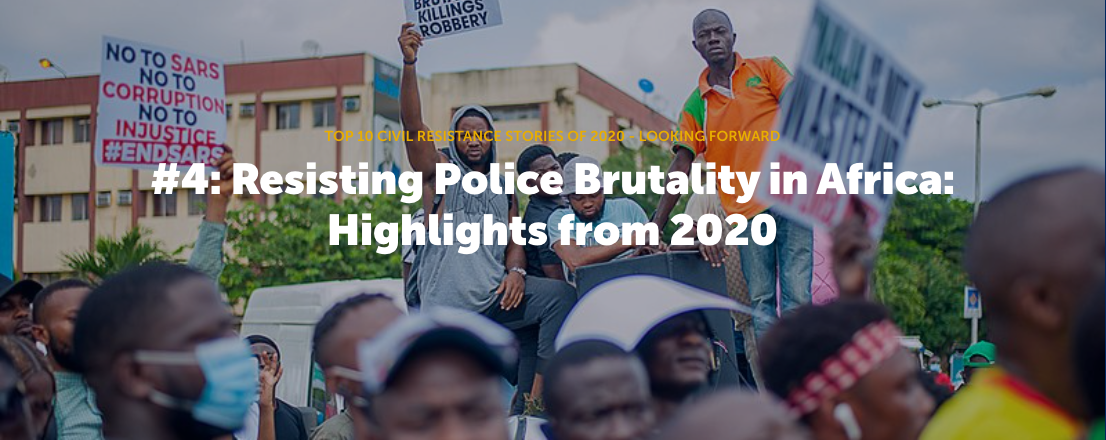
By: Phil Wilmot
While Black Lives Matter took center stage in the global media, similar struggles against police brutality were fomenting in the Sub-Sahara as well. 2020 was truly a year of protecting black bodies. In many African countries, authoritarian leaders enjoyed the Covid-19 pandemic and the excuses it offered for violent repression. In Uganda, for example, not a single Covid-19 death was registered until July 23. By that date, a half dozen Ugandans had been killed by police using pandemic conditions as an excuse for brutality, and countless citizens had been unjustly arrested, victimized by extortion, tortured, and otherwise abused. [...]
Read more
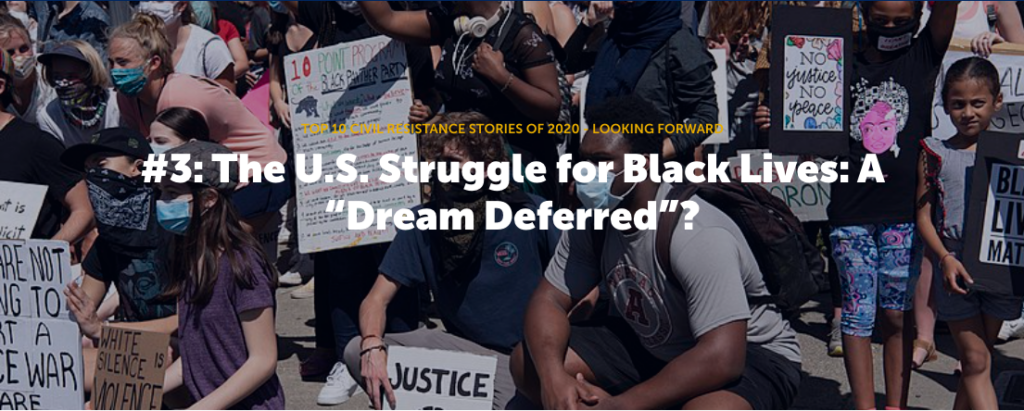
By: Rev. Tremaine Combs
With the deaths of George Floyd, Breonna Taylor, and Ahmaud Arbery, 2020 has seen a swell in support, prioritization, and even vitriol regarding the movement to cement in the public consciousness that Black Lives Matter. Although it has undergone numerous iterations since the first enslaved Africans were brought to the United States in the early 1600s, the modern movement for Black lives as it exists in 2020 has its roots in the 2012 death of Trayvon Martin in Florida. It then picked up steam with the uprising in Ferguson, Missouri after the death of Michael Brown in 2014. Some distinguishable trends, as well as challenges, set the movement apart from its antecedents. [...]
Read more
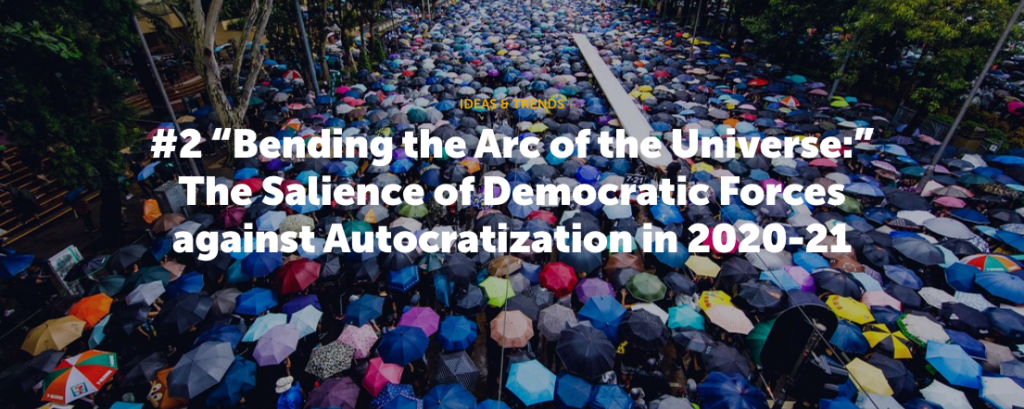
By: Maciej Bartkowski
In the past two decades, autocracies have been on the rise and aspiring autocrats in democracies have been gaining in numbers and strength. The 2020 democracy report by the V-Dem (Varieties of Democracy) Institute noted that by 2020, autocracies have formed a clear majority for the first time since the beginning of 2000, constituting 92 countries with 54% of the global population or 4.2 billion people. Furthermore, 35% of the world’s population, an additional 2.7 billion people, live today in countries that are experiencing a significant decline in their democracy index and that are often headed by elected anti-democratic demagogues. This is colloquially known as the third wave of authoritarianism, or “autocratization” [...]
Read more
By: Amber French
The COVID-19 crisis fundamentally altered the conditions in which activists organized in 2020, yet we still observed widespread political mobilization as a result of nonviolent movements. Perhaps then there is some silver lining in this crisis—we are reminded that repression and other unfavorable conditions (read: physical constraints) do not doom movements to failure. Activists and movements develop skills that enable them to overcome challenging social and economic conditions. It’s called human agency, and it’s what ICNC’s work is all about. [...]
Read more
